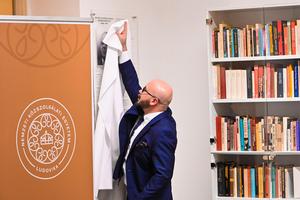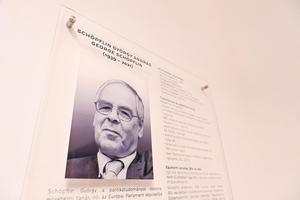Late György Schöpflin, historian, political scientist, and former employee of our university, was at home in England and Estonia, but his homeland is in Hungary. His personal library has also returned home, so the citizens of the university will be able to benefit from his collection during their studies.
The Minority Policy Research Group of Ludovika University of Public Service (LUPS) and the Central Library of the LUPS University Library together organised an opening ceremony of György Schöpflin's legacy - a book collection on 21st of November in the Main Building of Ludovika. During the program, the book collection was officially handed over to the citizens of the university, and the plaque summarizing the work and like of György Schöpflin was unveiled.
At the event, Zoltán Mészáros, director-general of the LUPS University Library, called the event somehow unusual since the two initiators, Piret Peiker, widow of György Schöpflin, and Iván Gyurcsík, the head of the Minority Policy Research Group could not be present in person. The director-general explained that performing the basic task of a university library is actually simple since books must be purchased for the main research and teaching areas of the institution. But each university library is interesting for the added value it can offer. He highlighted that the Schöpflin book collection contains 544 documents in Hungarian, English and German. 10% of this is fiction, 30% is related to the history of Central and Eastern Europe, and 60% is a volume dealing with sociological, legal, political and minority policy topics. The private book collection is noteworthy because the documents give us a glimpse of Professor Schöpflin as a historian, a researcher on minority policy and a Hungarian who is at home in England and Estonia but whose home was in Hungary.
"Through his scientific activities, as a researcher and lecturer, Schöpflin György was closely connected to the Ludovika University of Public Service" - was told by Brigadier General László Kovács, the scientific vice-rector of LUPS. As a researcher, he also emphasized that in addition to the online world, books and all tangible documents are particularly important today. The vice-rector explained: thanks to the initiative of Iván Gyurcsík, the cooperation of the Miklós Bánffy Library, the courier department of the Ministry of Foreign Affairs and Trade and the Hungarian Embassy in Tallinn, the generous donation of Piret Peiker, the legacy of the private library of late György Schöpflin arrived at LUPS last December. The book collection named "Schöpflin Legacy" is now a new part of the Central Library's Minority Policy Collection.
Ferenc Hörcher, director of the Research Institute for Politics and Government of the Eötvös József Research Centre, recalled his personal memories of György Schöpflin, the professor as a researcher and the words of his last volume as a colleague. At the end of his life, György Schöpflin participated in the work of the Research Institute for Politics and Government. Ferenc Hörcher emphasized that the name Schöpflin means a lot in the Hungarian culture, and the professor was proud of this tradition. His life work is also inspiring because it is multilingual, has a European outlook and is multidisciplinary. His last book, published by Ludovika University Publishing House, is a passionate critique of Europe's contemporary institutions and an equally passionate confession for Central Europe.
The donator, Piret Peiker, joined the event online and said she was very grateful for the space the university provided for the book collection. She hopes the room will not only be a repository for shelves but also a meeting point for inspiring conversations. Schöpflin's widow said that her late husband considered his participation in the work of the university very important both personally and as a researcher. He was energetic and happy to work at LUPS. His interests and the history of his intellectual development emerge from the documents of the collection. We can learn that he felt nostalgia for the Austro-Hungarian Monarchy and worried a lot about the peoples of the region. "I wonder which books will be taken off the shelves by the students who will become civil servants, police officers or even military officers in the future," concluded Piret Peiker, György Schöpflin's widow.









